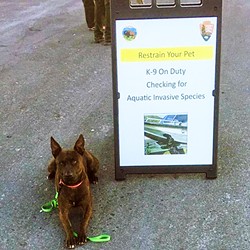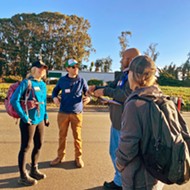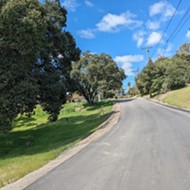[{
"name": "Newsletter Promo",
"id": "NewsletterPromo",
"class": "inlineCenter",
"insertPoint": "4",
"component": "15264767",
"requiredCountToDisplay": "0"
},{
"name": "Ad - Medium Rectangle CC01 - 300x250",
"id": "AdMediumRectangleCC01300x250",
"class": "inlineCenter",
"insertPoint": "8",
"component": "2963441",
"requiredCountToDisplay": "12"
},{
"name": "Ad - Medium Rectangle LC01 - 300x250",
"id": "AdMediumRectangleCC01300x250",
"class": "inlineCenter",
"insertPoint": "18",
"component": "2963441",
"requiredCountToDisplay": "22"
},{
"name": "Ad - Medium Rectangle LC09 - 300x250",
"id": "AdMediumRectangleLC09300x250",
"class": "inlineCenter",
"insertPoint": "28",
"component": "3252660",
"requiredCountToDisplay": "32"
}]
Boaters in San Luis Obispo County may be unknowingly harboring aquatic hitchhikers, and officials are ready to sniff them out.
Over July 3 and 4, professionally trained dogs from the Oakdale-based company Mussel Dogs smelled boats about to enter Lopez Lake for quagga and zebra mussels as a preventative course of action, rapidly cutting down the usual inspection time for the invasive species.
Barrie Valencia, the water quality chemist with the county public works department, told New Times that the dogs specifically search for juvenile mussels.
"Mussels as juveniles, ... you can't see them with the naked eye," she said. "They can be in water, and you won't know it."
Quagga and zebra mussels grow in massive numbers, Valencia added. A single zebra mussel can lay up to a million eggs during spawning season, and it can have up to three spawning seasons in a year. Post spawn, these mussels travel between waterbodies by attaching themselves to any available surface like boats, and cause problems for boaters by encrusting propellers and other watercraft parts.
They're a problem to Valencia's water quality department too. The county turns to Lopez Lake as a source of drinking water for the neighboring municipalities. If boats and other surfaces are left unchecked, quagga and zebra mussels can potentially attach to the infrastructure the county uses to draw and treat water from its lakes.
"They can also outcompete natural species and eat all their food," Valencia said. "There would be less fish, no algae, and water quality issues."
According to the California Department of Fish and Wildlife (CDFW), quagga mussels were discovered in Nevada's Lake Mead in 2007. The mussels later spread to its lower basin. That discovery was pinpointed as the first identification of quagga mussels on the western side of the Continental Divide. The first confirmed sighting of zebra mussels in California took place in 2008 at San Justo Reservoir southwest of Hollister.
Since these findings, water departments around the state have closely monitored quagga and zebra mussel growth. In SLO County, mussel inspection is standard protocol for any boat that wants to jump in local freshwater. No lake or reservoir in the county has ever experienced a quagga and zebra mussel outbreak, Valencia said.
"We are year-round inspecting for quagga and zebra mussels," she said. "We don't want to have them enter the lake. Now, we're inspecting with dogs because there's a higher volume of boaters going to the lake."
If the dogs do sniff out mussels on a boat, they'll signal handlers and other inspectors by either focusing on that spot or by sitting down. The county conducts other kinds of testing too. Every month, the water quality laboratory employs artificial mussel substrates—a surface on which mussels can grow if they exist in that freshwater body—to check for the mollusk.
For boaters, both Valencia and the CDFW recommend cleaning, drying, and draining all boats and equipment before visiting local lakes. They must check all exposed surfaces, especially because the mussels feel like sandpaper when touched. Boaters must also wash the hulls thoroughly, remove all plant and animal material, drain and dry all areas including the lower outboard unit, dispose of any unused bait in the trash, and empty and dry any buckets.
Frequent and diverse testing is crucial for the county as a tactic to prevent not only an invasive mussel infestation but also heavy maintenance costs.
"I don't believe it would be the end of recreation [if quagga and zebra mussels are found in the lakes]," Valencia said. "We would be on a map of infested lakes. It would be an increase in money, like to buy a decontamination unit, for management. It would be an increase in cost." Δ
Latest in News
Readers also liked…
-

Coast Unified teachers upset over new position's salary and qualifications
Oct 20, 2022 -

SLO police identify alleged driver who hit and killed couple
Dec 22, 2022 -

When the levee breaks: Oceano residents, county officials walk a tightrope of regulations to manage Arroyo Grande Creek, which some say led to the levee's failure in January
May 18, 2023










